It's safe to say that Japan's Makankosappo/Hadoukening/Kamehameha photo meme made quite a mark on the English speaking regions of the internets in 2013. With images of people using invisible energy attacks to blast others into the air going viral in March, Makanokosappo was dubbed by many sites to be "the planking of 2013."

Aside from the advantage of being visually rather than textually based, the popularity of Dragonball and Street Fighter outside of Japan made it easy for Makanokosappo to cross cultural and linguistic boundaries and catch on with internet nerds around the globe. Now, Japanese humor is often painted as being all-but impenetrable by those without a high level of proficiency in the language, and the idea of not being able to be at least moderately funny in Japanese is quite a discouraging prospect for learners in the early stages of their studies.
But never fear! Just because you aren't JLPT N1 yet doesn't mean you are doomed to bore the pants of others when communicating in Japanese. As this article in The Japan Times points out, there is lots of Japanese humor that only requires a basic command of the language to be understood, enjoyed, and used to send your Japanese friends flying into the air from the sheer force of your wit! Three contenders for this year's Japanese Buzzword of the Year Award have been taken up on the internet in a big way and become memes, and they are perfect examples of how Japanese humor is quite similar to the kinds of things that make us English speakers giggle. So, without further ado, let's us proceed to teh lolz!
Meme #1: Itsu Yaru Ka? Ima Desho!
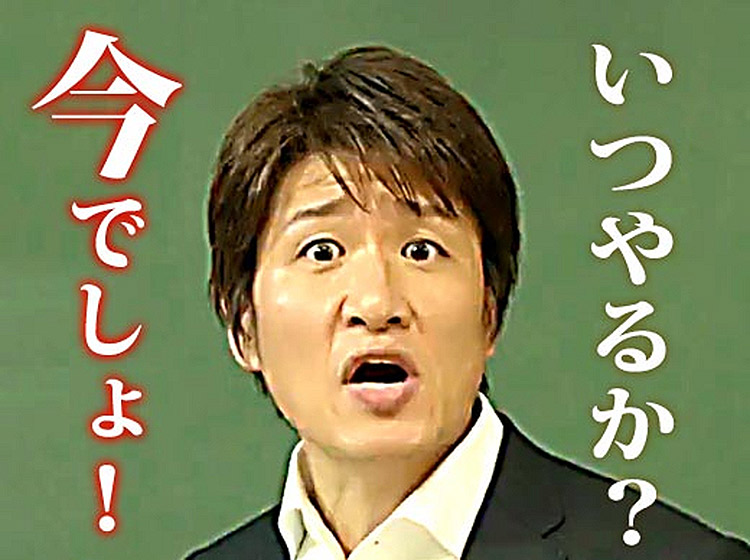
Osamu Hayashi's now-famous catchphrase "Itsu yaru ka?…… Ima deshou!" (When are you actually going to do it? NOW!) made its first appearance in 2012 as part of a T.V. commercial for Toshin High School. A nationwide chain of cram-schools focused on preparing students for the infamously grueling university entrance exams, Toshin tries to lure in customers by showing clips of their best teachers motivating students through their "unique characters" and "inspirational words." While making the mother of all doya-gao (a Japanese phrase describing look of smugness or self-satisfaction), Osamu faces his students and asks "Itsu yaru ka?" (When are you actually going to do it?), leaves the smallest of pauses, and then answers the question himself "ima desho!" (it's now or never, right!). The word "ima" simply translates as [now/the present], while "desho" is a grammatical term that, in this particular case, implies that the speaker is very confident that their opinion is correct.
The video gained some attention, but it wasn't until Toyota hired Osamu to do a parody commercial in 2013 that the videos went viral and Osama's catchphrase rapidly became one of the most popular memes of the year. Toyota's commercial mimics the original video, but the "yaru" in "istu yaru ka" is replaced with "kau" (buy), turning the phrase into "When are you actually going to buy it? NOW!"
Usage and Examples
Within a matter of weeks of the commercial being aired, Twitter, Facebook, Mixi, and other such sites were flooded with remix videos, gifs, and image macros.
Another popular way to procrastinate online is to change "itsu yaru ka?" to another question, or alter the response by replacing "ima" with another word or phrase. In the picture below, yaru やる has been replaced with 殺る, which is also pronounced "yaru" but means "to kill" or "to knock off!"
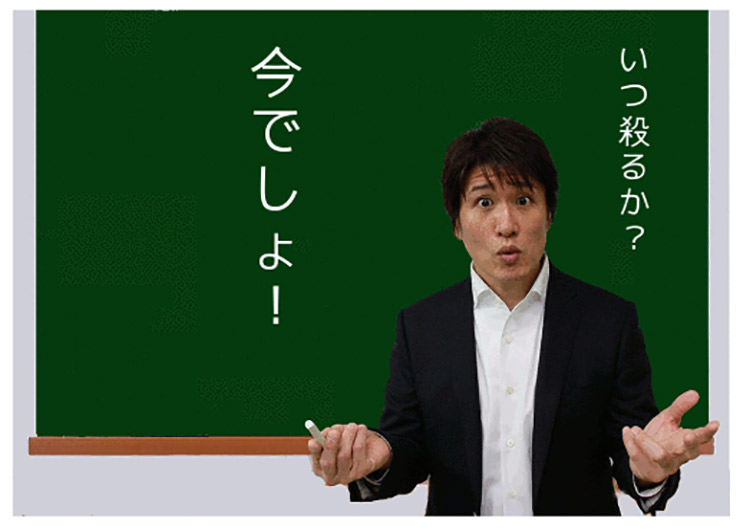
As Japanese has quite a limited number of sounds, the majority of words have at least one homonym, aka a word that is pronounced the same but written differently and has a different meaning. In the original Toshin commercial, the "ima" meaning "now/the present" is written 今, but there is another "ima" which is written as 居間 and means "living room."

So when're you going to start using this meme? Err… sometime soon?
Meme #2: Je! (Je!) (Je!)
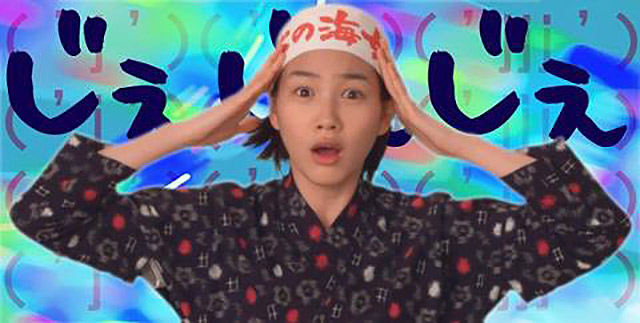
In standard Japanese, surprise or shock are usually expressed with the word "eh?", meaning something like "huh?" in English , or "bikkuri", which translates roughly as "what a shock!" However, in the dialect spoken in Kosode, Iwate prefecture in North-East Japan, surprise is given voice to with the expression "je!". The greater the surprise, the more times you repeat the sound, three repetitions usually being the maximum.
One Japanese website gives the following guidance for usage:
Level 1 'Je!'
- Udon yori soba no hou ga karori ga takai da te
- You know, soba noodles are apparently higher in calories than udon noodles
Level 2 'Je! Je!'
- THE BOOM ni wa okinawa no hito wa hitori mo i inai rashiiii yo
- It seems that not one of the members of The Boom, who play Okinawan-style music, are actually from Okinawa!
Level 3 'Je! Je! Je'
- Ano hito, ojisan ni mieru kedo, jitsu ha obasan nan da yo ne
- That person over there – they might look like an old man, but it's actually an old woman.
So, perhaps you are wondering how and why "je!" became so popular? Well, it's all thanks to a T.V. drama called 'Ama Chan' that was aired on NHK from March to December this year. The story revolves around a girl named Aki Amano who visits her mother's hometown of Kosode when her grandmother is taken ill. I don't want to give away too many spoilers, but I will say that the story involves Aki struggling to qualify as a sea urchin diver and aiming to become a famous idol at the same time. The majority of the main characters in the series speak in the Kosode dialect, and thanks to both the popularity of the show the once little-known expression "Je" has taken off in a big way.
Usage and Examples
As with "Ima Desho!", YouTube videos featuring the expression have been a big hit. An ambitious user created his own song inspired by the show, with a "Je"-filled chorus.
- Sukoshi odoroku je!
- When it's a little surprise 'Je!'
- Futsuu ni odoroku je!
- When it's an every-day surprise 'Je! Je!'
- Sungoku odoroku je! je! je! je! je!
- When it's a big surprise 'Je! Je! Je! Je!'
- Nipponcyuu je! je! je!
- All through Japan 'Je! Je! Je!'
Ever since the first episode, when Aki's mother receives a message on her phone where "je!" is written using the emoji ('j'), usage has been a huge hit on social sites such as Twitter.
'Je!' = ('j')/
'Je! Je!' = ('jj')/
'Je! Je! Je!' = ('jjj')/
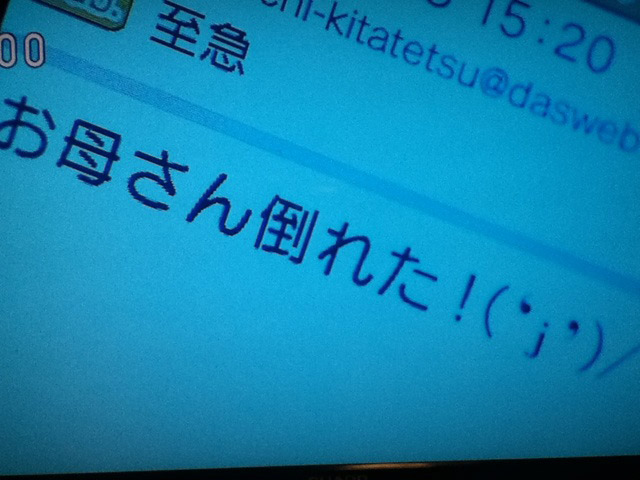
- Okaasan taoreta! (‘j’)/
- Mum feinted! :O
Or you could just make a macro by slapping the phrase on a picture of a surprised looking cat because, let's face it, cute animals are what the internet's really about.
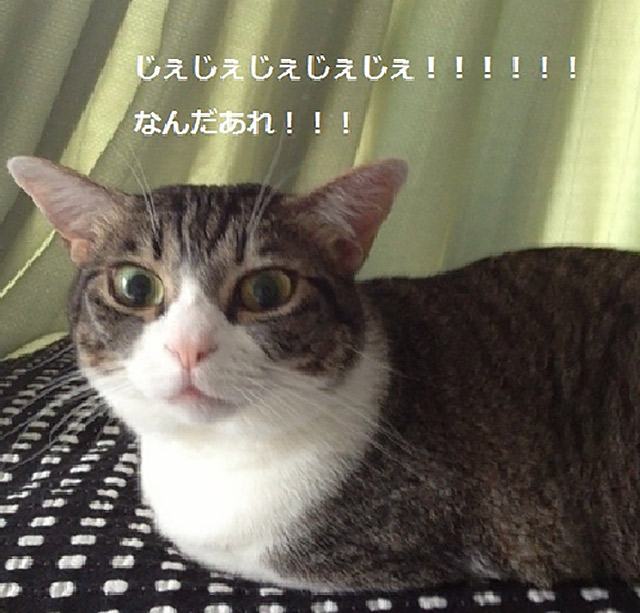
- Je je je je je!!!!!! Nanda are?
- Ahhhhhhhhhhh! What is THAT?
Meme #3: Bai Gaeshi
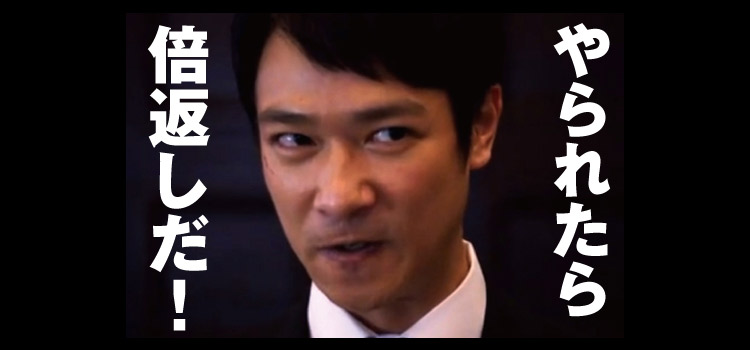
Our third meme also comes from a 2013 T.V. drama. "Hanzawa Naoki" centers around an incredibly bad-ass banker called (shockingly) Hanzawa Naoki (!), who works for the largest financial institution in Japan, Tokyo Chuo Bank. The series tracks the challenges and scandals he encounters as he climbs his way up the administrative ranks. His catch-phrase "yararetara yarikaesu, baigaeshi da!" means "If your enemies hurt you, take double the payback!", and as the series progresses and his opposition get more dastardly it becomes "jyuubai gaeshi da!" (10 times the payback), and eventually "hyaku bai gaeshi da!" (take 100 times the payback!).
Just like "ima desho!" and "je! (je!) (je!)", this one-liner was a huge hit with internet users, and popped up all over the place as the show gained popularity.
And of course there are remixes:
The interesting thing about the phrase "bai gaeshi da" is that without a specific context it can have a lot of meanings. It can be translated as "double the payback" or "give back twice as good as you get", depending on how it is used. As a result, there have been numerous discussions about what else should be given or taken back in double.

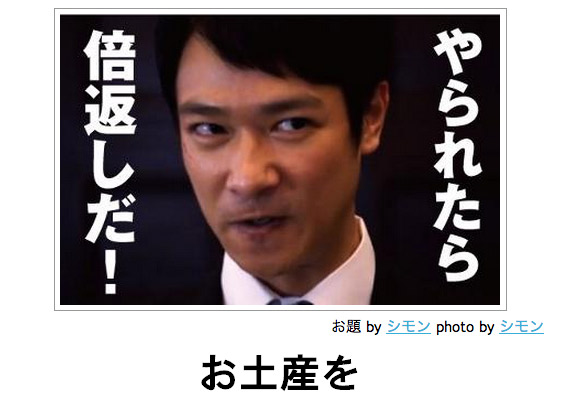
Humor really is one of the most awesome forms of communication out there; sharing a joke and laughing with someone allows you to break down barriers, establish common ground, and I know I would be more likely to want to spend time talking with someone who can make me laugh. Moreover, language learning is more efficient, beneficial and, well, fun (!) when you are enjoying yourself as you study, so exposing yourself to Japanese humor seems like a pretty good idea overall. One of the great things about these memes is that they're not exclusively used online – they have been appearing on T.V. and in real-life conversations throughout the year, so you can work them into both your written and spoken Japanese!
Oh and while you're here. They give out awards for these things. Enjoy~
